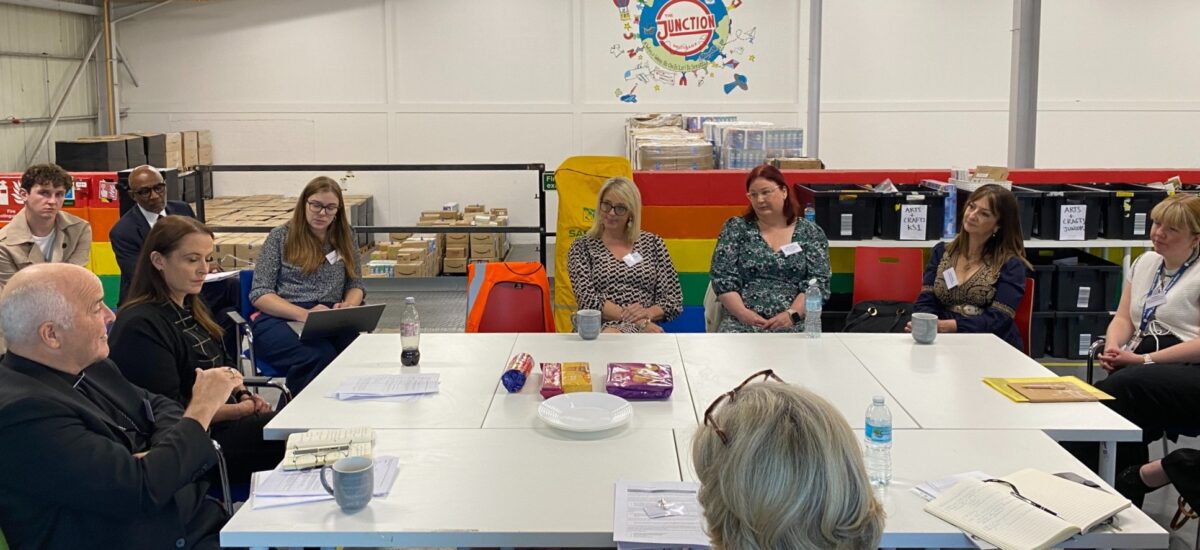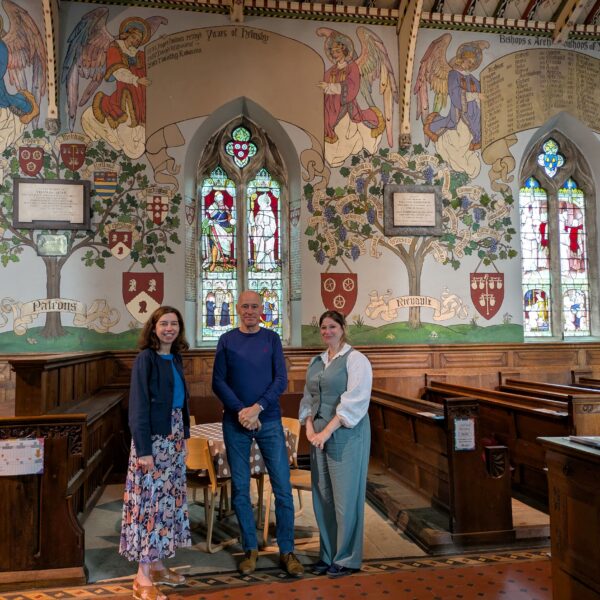The Archbishop of York has visited the Junction Multibank in Middlesbrough, calling on the government to scrap the two-child limit and take urgent and decisive action on child poverty.
During the visit, the Archbishop of York Stephen Cottrell met with multibank staff and local leaders, to hear about the impact of child poverty in Middlesbrough and the surrounding areas. The Multibank, which has distributed 1.5 million items to more that 224,000 individuals since it opened in November 2024, seeks to meet the immediate needs of families who are struggling with the challenges of hardship. It distributes support via a network of 1,259 referral partners, who provide on the ground relationships with families seeking support.
During the visit, Archbishop Stephen said: “I have been inspired by the work of the Junction Multibank and the efforts of local anti-poverty charities in the Tees Valley to support children and families. But the need for their services shames us as a society. As children head back to school, I hope and pray that the government will facilitate joined up policy to address systemic failures that cause child poverty, so that all our children grow up with hope, dignity and access to opportunities.”
Beth Major, CEO of The Junction Foundation, who host the multibank in Middlesbrough as well as providing varied support to families across the local area, said: “It’s a privilege for The Junction to lead The Multibank locally, supporting professionals across Tees Valley to tackle child poverty and seeing the impact it’s had in such a short period of time. This initiative meets essential needs with dignity and compassion—helping level the playing field for children through items like school supplies and hygiene products. While it’s deeply saddening that such a service is necessary, it’s a vital response to the disproportionate impact of poverty in our communities.”
The visit particularly sought to highlight calls on the government to scrap the two-child limit and benefit cap as part of their child poverty strategy, due to be released in the autumn. Figures published in April by the DWP confirm that 19,580 families in the North East were hit by the two-child limit. Analysis from the North East Child Poverty Commission found that of these families, 59% are single parent families, 47% are families with at least one adult or child with a disability or health condition, and 52% of families have at least one parent or carer in work.
During the visit, Archbishop Stephen held a roundtable discussion with local leaders who are working to address rising levels of poverty in the Middlesbrough area. The discussion focussed on the impact of poverty on families in the region, and the steps government need to take to impact on children’s futures.
During the discussion, Lesley Storey, CEO of My Sister’s Place, a charity which supports women who have experienced domestic abuse and violence and their families, said: “Across our services, we are seeing people who feel deep shame because of the stigma of abuse and violence, and then on top of that the stigma and shame of poverty. There is no route to ending child poverty without abolishing the two-child limit. It’s not an easy thing, but there is no route without it. Children have a childhood today, and they don’t get another chance to re-live this.”
Lisa Pickard, CEO of Five Lamps, which supports more than 25,000 socially and financially excluded individuals across the North East and Yorkshire, through financial inclusion and housing support, youth services and home care, said: “We see the impact of child poverty every day. Today is the last day of our summer holiday activities, and even from last summer we are seeing worsening need. Kids only have one chance at a childhood. We are storing up an economic crisis for the future if we don’t deal with it now. We’re putting money into rebuilding communities, but we’re not investing in children.”
Helen Howson, CEO of Citizens Advice Darlington, Redcar and Cleveland, said: “The stigma and blame that people experiencing poverty feel is something we crucially need to address. So often, people we see are blamed for their own circumstances. As a society we need to say enough. We need better for people. Do we value our young people or don’t we?”
Shola Ajetunmobi represented Turn2Us, who work on financial exclusion in the region. She said: “We support families who are in a constant struggle to keep up quality of life for their children. Children miss out on activities, and children are in fear of asking for things they need or want. They feel the disparity between them and their peers. The two-child limit must be scrapped.”
Natalya Robson, team lead for child poverty and digital services at Stockton and District Advice and Information Service, supports a project providing benefit advice in schools. She said, “I don’t know when providing food, shelter and beds to children became something we aspire towards. It should be a basic right. You only get one childhood. It is system failure when children can’t dream bigger than the things they urgently need.”
Katrina Morley, Founder and CEO of Tees Valley Education, a multi-academy trust based in Middlesbrough, Redcar and Cleveland and co-author of Tackling Poverty and Disadvantage in Schools, said: “We must understand that the journey to where we are now is because things have been getting worse over the last ten years. There isn’t a cohesive spirit of putting kids first. If we look after our children, everybody benefits. The kids I work with don’t have a lack of ambition – they have a lack of opportunity. People who make policies haven’t walked these streets or lived in these houses. We must tell the real living story of people’s lives.”
Paul Wales, CEO of Actes Trust, said: “We have to invest in our young people, because they are not getting their childhood back. We need to work together, as organisations, to get the support to people who really need. The work we do mentors and advocates for kids. We pick them up when there has been in a bump in the road.”
The visit comes as a growing number of leaders are calling on the government to abolish the two-child limit, including recent calls from former Prime Minister Gordon Brown to introduce reforms to gambling taxation to pay for the two-child limit and benefit cap to be scrapped, and lift half a million children out of poverty.


